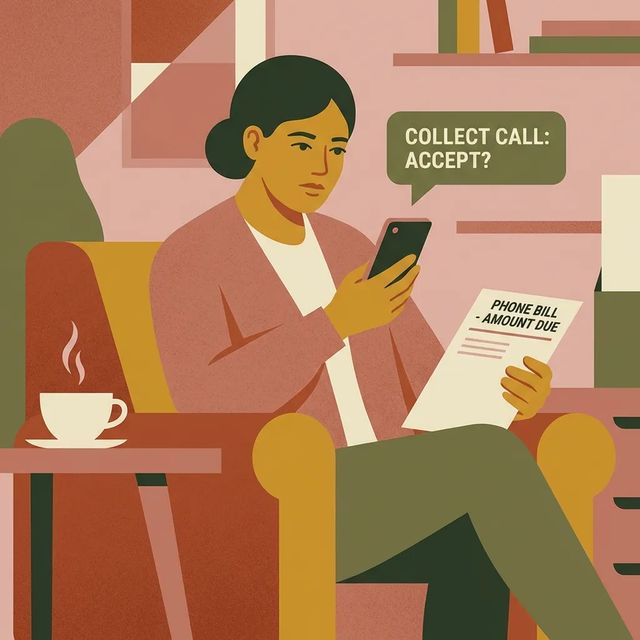Tarrant County Jail
Explore
Find an Inmate at Tarrant County Jail
Search for a loved one and send messages and photos in minutes.

Guides for This Facility

How to Visit Someone at Tarrant County Jail: When to Arrive, Cutoff Times, and What to Expect
Visiting someone at Tarrant County Jail goes smoother when you plan around the sign-up window and processing cutoffs. Here's how to time your arrival so you don't get turned away.
Read Guide
Three Ways to Put Money on an Inmate's Account at Tarrant County Jail
The fastest option is Access Corrections Secure Deposits. Make an online deposit with a Visa or MasterCard — no need to go anywhere in person.
Read Guide
Understanding Phone Calls from Tarrant County Jail: Free Calls, Collect Charges, and Who Pays
Phone calls from Tarrant County Jail can be free during a very specific window—and collect (meaning you pay) the rest of the time. Here's how the booking-stage phones work, when "local" matters, and who to contact for exact rate details.
Read GuideAt a Glance
Visitation
- Out‑of‑town visitors living more than 150 miles from Fort Worth are allowed a 40‑minute visit after residence verification at the time of the visit.
- Visitors 18 and older must present photographic identification; visitors under 18 may use a valid school photo ID.
- Any visitor 17 or younger must be accompanied by an adult (18 or older).
Communication
- Free phone calls are available only while an inmate is in the booking process and each holding cell has a telephone for arranging bail or contacting family or an attorney.
- Calls made from holding-cell phones are free within the local dialing area.
- Calls placed from holding cells to numbers outside the local dialing area are treated as collect calls and the recipient is responsible for fees through Smart Communications.
Mail & Letters
- Regular inmate mail (postcards, letters, greeting cards) is scanned and made available to inmates on mobile electronic devices.
- Senders can sign up for MailGuard Tracker to view delivery status and download copies of processed mail.
- Only up to 10 unframed photographs no larger than 4x6 inches may be enclosed with correspondence to an inmate.
Sending Money
- Tarrant County recommends Access Corrections Secure Deposits to place money on an inmate account using Visa or MasterCard.
- Access Corrections supports sending payments quickly for court-ordered obligations, bail, and parole/probation online.
- CashPayToday walk-in deposits require registration and a printed barcode for certain stores, and most participating stores operate about 8 a.m.–9 p.m.
Facility Info
- Only inmates sentenced to TDCJ and being transferred to TDCJ-contracted facilities may release their property and clothing directly.
- Authorization to release property for undue hardship requires approval by a Captain or higher; the Booking Watch Commander decides when Jail Administration is closed.
- The Chaplaincy office is located at 200 Taylor Street, 7th Floor, Fort Worth, TX 76196 and its phone number is 817-884-3088.
Based on official sources and community feedback. Learn how we verify
Topic Overviews
Visitation
Visiting at Tarrant County Jail is straightforward once you know the rules. Live more than 150 miles from Fort Worth? You may qualify for a 40-minute visit—just be ready to verify your residence when you arrive. If you're 18 or older, bring a photo ID. Visitors under 18 can use a valid school photo ID, but anyone 17 or younger must be accompanied by an adult. Leave these items behind: tobacco, lighters, cameras, recording devices, cell phones, backpacks, purses, and unlabeled prescription medication. You may need to stay inside the building during the visit, and staff can end things early for disorderly or unsafe behavior. Bringing an infant? Limited items are allowed after visual inspection.
Read full guideCommunication
Phone access at Tarrant County Jail is easiest during booking. Each holding cell has a telephone so inmates can arrange bail or contact family and attorneys. Calls within the local dialing area are free. Calls outside the local area go out as collect calls billed through Smart Communications—the recipient pays. Need telephone assistance related to an inmate? Call the county operator at 817-884-1111 (listed on the inmate search page). For other communication options or vendor account setup, follow the agency and vendor instructions provided.
Read full guideMail & Letters
Tarrant County Jail scans postcards, letters, and greeting cards, then delivers them electronically for inmates to view on mobile devices. Want delivery updates? Sign up for MailGuard Tracker to check status and download copies of processed mail. Legal mail works differently—send it to the jail's street address: 100 North Lamar Street, Fort Worth, TX 76196. Books and magazines have strict sourcing rules. New soft-backed books must ship directly from an established publisher via UPS or USPS only. Magazines and puzzle books must come as subscriptions from a publisher. You can include up to 10 unframed photos (max 4x6). Contraband gets returned to the sender, and only USPS-delivered mail can be traced if lost.
Read full guideSending Money
Tarrant County recommends Access Corrections Secure Deposits for online payments using Visa or MasterCard. The same service handles court-ordered obligations, bail, and parole/probation payments. Need help? Live bilingual agents are available 24/7 by phone. Prefer to pay in person? Walk-in deposits through CashPayToday are an option—register first and print a barcode for participating stores (most locations are open roughly 8 a.m.–9 p.m.). You can also mail USPS or Western Union money orders to the Detention Bureau mailing address. Handling charges start at $2.95.
Read full guideCommon Questions
Showing 6 of 16How long are visits for out‑of‑town visitors at Tarrant County Jail?
If you live more than 150 miles from Fort Worth, you may be allowed a 40-minute visit. Your residence must be verified at the time of the visit.
VisitationWhat identification do I need to visit an inmate at Tarrant County Jail?
If you’re 18 or older, you must present photographic identification (such as a Real ID, driver’s license, passport, or military ID). If you’re under 18, a valid school photo ID may be accepted.
VisitationCan I bring items for my infant during a visit to Tarrant County Jail?
Yes, but it’s limited. You may bring one diaper bag, a small blanket and bottles that fit inside it, and an infant carrier, and everything is subject to visual inspection.
VisitationWhen are phone calls free at Tarrant County Jail?
Free calls are available only while an inmate is in the booking process. Holding cells have phones that can be used to arrange bail or contact family or an attorney.
CommunicationWho pays for collect calls from holding cells at Tarrant County Jail?
Local dialing-area calls from holding cells are free. Calls to numbers outside the local area are processed as collect calls, and the recipient pays the collect-call fees through Smart Communications.
CommunicationHow do I reach the Tarrant County Jail telephone operator?
Call the county telephone operator number listed on the inmate search page: 817-884-1111.
CommunicationMore Guides
Ready to Connect?
Search for your loved one to start communicating today
Did You Know?
Tarrant County Jail limits letters to 12 by 16 inches. All general mail gets scanned into an electronic system — inmates read it on a screen, not on paper.
This guide is based on feedback from 756 families and official facility documentation. Learn how we verify
